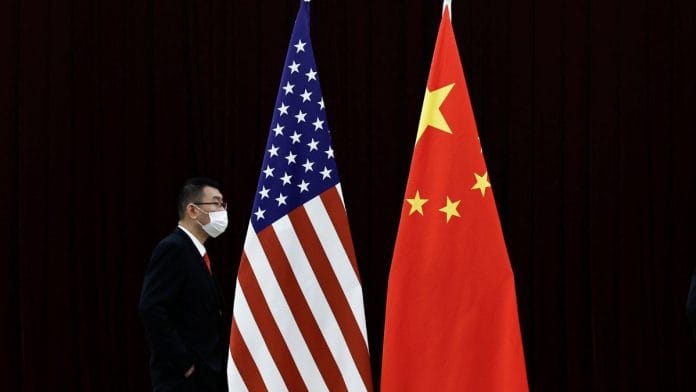The upcoming US presidential election in November is capturing the world’s attention, not only for its global ramifications but also for its unpredictable twists. China, in particular, will face potentially noteworthy consequences based on the election’s result.
Although the Chinese Foreign Ministry has refrained from commenting on the developments, it has dismissed President Joe Biden dropping out of the election as an internal matter of the US. A user on the Chinese microblogging site Weibo aptly captured the sentiment among many Chinese regarding the US elections: “For many Chinese, the US presidential election represents the pinnacle of political engagement.” Extensive discussions across Chinese media and social media platforms suggest a level of interest that rivals even major domestic events, such as China’s recently concluded third plenum.
Trending on Chinese media
Biden’s announcement of withdrawal from the election race on 21 July, citing health concerns, sparked intense debate. Chinese observers noted that Biden’s exit represents a significant setback for the Democrats, raising uncertainties about Vice President Kamala Harris’ candidacy, particularly regarding her political experience, lack of popularity and charisma. The advantages and disadvantages of Harris over Biden are also being debated: While Harris addresses some of Biden’s shortcomings, such as his age, she lacks certain advantages that Biden had, such as connections in the Rust Belt and the appeal of being a white man.
Interestingly, Chinese discussions indicate a preference for former President Donald Trump, with many believing he has a better chance of winning. Trump has received praise, particularly following an assassination attempt against him. Debates on platforms like Weibo are centred around the voting behaviour of the US citizens. One user suggested that previous Biden voters may not have been genuine supporters of the Democrats or Biden himself, but rather voted based on their views of Trump. Like four years ago, the election appears poised as a contest between Trump supporters and detractors.
This viewpoint was also shared by Hu Xijin, former editor-in-chief of the Chinese Communist Party’s newspaper Global Times. He noted that Trump’s strong personality has sharply divided American voters into two camps: those who admire (love) him and those who oppose (hate) him.
According to Li Cheng, professor of political science and founding director of the Centre on Contemporary China and the World at the University of Hong Kong, Trump has often declared his aspirations to be remembered as the greatest president in US history. Following his recent survival of a shooting incident, Li predicted that Trump’s team and supporters would actively work to strengthen this perception. However, instead of uniting American society, Li warned that the incident could exacerbate divisions and potentially heighten the risk of political violence.
Regarding speculation about the alleged assassination attempt on Trump, many in China strongly believe it was not staged, although various conspiracy theories are circulating. Li asserted, “the chances of Trump orchestrating this incident are almost zero. Firstly, he currently leads, making the assassination attempt pointless. Secondly, suffering an injury from a gunshot to the right ear is highly risky.” A Weibo user echoed similar sentiments discussed in widespread English media, pointing out that during Trump’s speech, he coincidentally tilted his head at that moment, and his habit of shaking his head potentially saved him from being shot in the head.
Another post on Weibo emphasised that regardless of its authenticity, Trump has strategically leveraged the assassination attempt and the powerful image of him raising his fist while bleeding to bolster his popularity. Skillfully navigating media coverage, Trump has fortified his persona as a defender of the nation, resonating strongly with supporters and swaying skeptics alike. The post further added that surviving the assassination attempt has further solidified his image as a symbol of American resilience. It reinforces the idea that his survival reflects a blessing on America itself—Trump embodies America, and America embodies Trump.
There is considerable debate about the prospective foreign policy direction of the next US president. Zheng Yongnian, President of the Qianhai Institute of International Affairs at the Chinese University of Hong Kong (Shenzhen) has described the US election as the biggest global risk of the year with potential implications for China. He suggests that a Democratic Party victory would likely mean continuity and a predictable US-China policy.
There is a belief that Trump would maintain a tougher stance on China. His recent statements, labeling China as the biggest threat to the US, have garnered significant attention. Additionally, remarks from his running mate, JD Vance, advocating for increased tariffs on Chinese goods, are seen as part of the Republican strategy to exert pressure on the Chinese economy.
Also read: China can’t take India’s rise as a middle power. So it’s blaming heightened tensions on US
US-China relations
In China, the upcoming US presidential election holds significant importance, underscored by the prevalent belief that regardless of the outcome, China will remain a central focus. Throughout the campaign, efforts to heighten concerns about the China threat are expected, fuelled by frequent mentions from presidential nominees and American officials. This discourse has prompted a trending hashtag on Weibo, with users cautioning the US against unnecessarily dragging China into the election rhetoric.
Anticipations vary regarding the election outcome: a Trump victory might lead to escalated tariffs and economic challenges. In contrast, a Harris victory could indicate a continuation of policies concerning Taiwan that diverge from China’s interests. Regardless of who assumes power, restoring US-China relations will be challenging.
Overall, the extensive attention paid to US-China relations in the Chinese strategic community and the media underscores the election’s critical importance in shaping future ties.
Sana Hashmi is fellow at Taiwan-Asia Exchange Foundation. She tweets @sanahashmi1. Views are personal.
(Edited by Ratan Priya)






